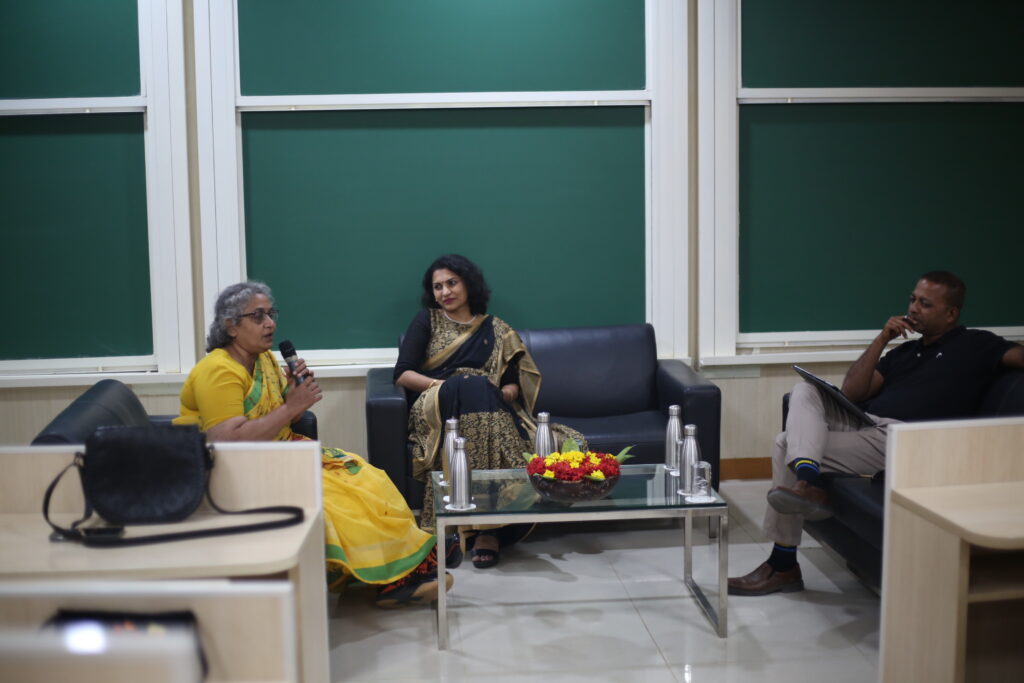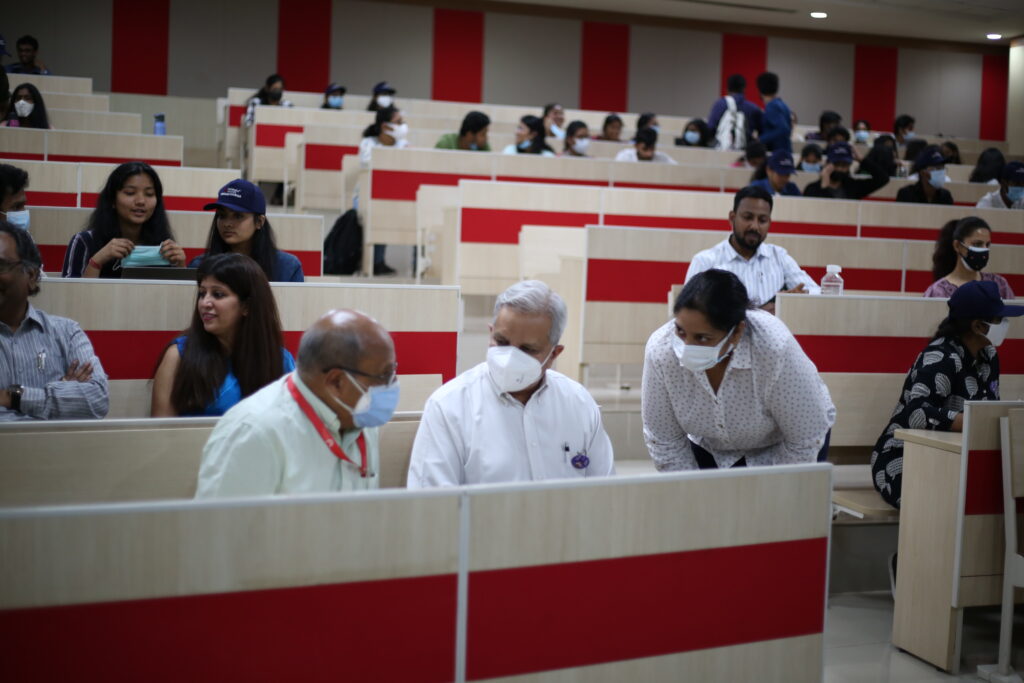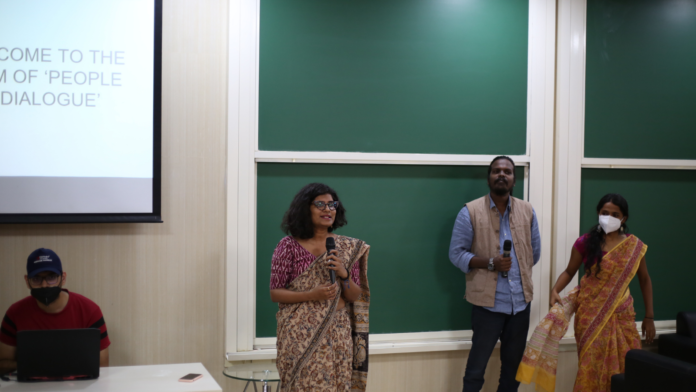Hiranmayee, Jasper, Meghna, in an interactive session at Mahindra University
A message from IWD celebration at Mahindra University
Mahindra University engaged its students and faculty with the gender justice issues through a week-long celebration of International Women’s Day that concluded yesterday (10.3.2022). Women speakers talked about their hardships at the start of their career in ‘men’ dominated work spaces. In between, a workshop conducted by People for Dialogue team interacted with the students and faculty on issues of sexism and insensitivities around.
Blind-spots & Casual sexism
Women and men both should understand casual sexism in day-to-day life and confront it to reach gender justice. This message was sent across the University at Women’s Day celebration on 10th March 2022. People for Dialogue, team of three speakers, called it “from sitting in to sighting with Blind-spots” and made the students and professors to think, identify and reflect on thought patterns or behaviors that might be insensitive to the people/communities that find themselves at the receiving end, intended or not. The team of three coordinators- Hiranmayee Saipriya, Jasper Jessie, and Meghna, addressed such ‘blind-spots’, raising the realistic issues. They fostered the idea to educate, where learning comes through self-reflective activities, instead of people talking at them constantly. They used a method of constructive criticism drawn from lived experiences, rather than shaming or pinning blame, to explain the layers of sexuality. This workshop brought the issues of gender bias, stereotypes, and casual sexism to meaningful discussion.Vice Chancellor Prof Yaj Meduri participated in this workshop along with deans and professors.
Gender equal spaces
Another engaging activity was the panel discussion on ‘creating gender equal spaces: from policy to practice’, which examined the journey and the progress in achieving a gender-equal working environment. Speakers critically reflected on the idea of policy formation and devising techniques to rectify implementation lacunae in creating gender equal spaces. Eminent educationalist and researcher Dr. N. Mythili, Prof. (Dr) Pradeep Racherla who holds experience in strategy consulting and worked with multinationals and startups, and Anita Manda, Director at Service Now with two decades of professional experience have addressed the implementational gaps in policies trying to achieve the gender gap and empowerment. Law professor Alok Verma moderatedthis discussion apart from raising the current implementational challenges. Mythili and Anita shared their anecdotes on difficulties faced by them at the start of their career in the fields predominantly occupied by the men. Dr. Maythili recalled: “I was the first female to join the team of a field researcher in a rural location working on education policies for primary schools and had to struggle on day to day basis even for the basic means of living with no one to hear about issues related to women where the whole research was to make education accessible to the girl child.” Sharing a similar experience, Anita Manda recalled: “Twenty years before, No one had the idea that girls can also be a software developer in the tech industry and the student ratios were marginally low when it came to joining the tech colleges and today the scenario has changed with we setting up examples and give the young girls a hope to take their tech careers seriously.”

Dr. Pradeep Racherala recalled his experience of working with tech startups and multinationals headed by women leaders in the US, “On the trend of the western corporation, Indian corporate houses have now realized the worth of expertise of women leaders and the sense of empathy and emotional capital they bring in the company, an active pursuit of gender-inclusive practice has already taken the center stage and the companies are really caring about their social image.”It was also brought up by the panel that the industry has seen a new trend of organizing coding competitions and technical webinars to motivate the young female technocrats to participate and build networks. The discussion was also about breaking the ‘glass ceiling’ and ‘cliff ceiling’, especially in the cases where women have to face issues leaping up in the career from middle management to top management and realized the need for corrective policy and implementational measures of government, voluntary organizations, and corporates. India being the fastest growing economy needs to course-correct its policies and attitude to make the transition from learning practice a smooth run considering the fact that India has the majority workforce falling in the bracket of the early 30s, felt the panelists.

Audience
Freedom is casualty with increase in marriage-age
At the beginning 30 students debated the new Parliamentary enactment increasing the age of marriage with its merits and demerits for more than three hours. The debate saw a wide array of arguments ranging from how this move by the government promotes gender equality, overall health, and mental wellbeing of women to why this move will not have the desired impact and will instead lead to an increase in illegal marriages in India along with taking away the personal freedom of women.One of the common arguments was how this move will play an important role in reducing the dependency of women on marriage to gain social and economic status. A few students brought out the inevitable link of the relation between this law and the Right to Education. They noted that this law will lead to an enhanced focus on the education and career of women in our society instead of halting progress with the marriage. On the contrary, the student ‘opponents’ explained how the legislation prohibiting the marriage of woman up to 21 years will be counterproductive. It was pointed out that this law will take away the right of women to have a say in their personal matters. Without positive supportive programs, welfare measures to facilitate education, health and nutrition for women, a mere declaration of marriage age will not help in preventing the marriages of girls below 21 years of age. Some debaters pointed out the possible misuse of this law by parents to punish their daughters for choosing their life partners without their approval. They criticized that this law is not well thought out, well researched, and does not reflect the reality of marginalized women. It is a paradox that a girl can vote, enter into a contract, consent to sexual intercourse at the age of 18 years but she cannot marry, questioned a student amidst claps. What needed is a program to ensure health, education and other activities for women until they reach 21, so that family will not be constrained of sending her to marital house. Dean, School of Law, Mahindra University, Prof. M Sridhar Acharyulu said that real danger of this law is that a person who marry a girl below 21 age, will be criminally prosecuted and jailed, which can cause havoc among families. Teachers Jayashree, Aparna, Darshna, Mona Patnaik, Shreeja and Alok Varma organized the events. Prizes were given to Ambati Swechcha (First prize of Rs 5000), Trishul K (Second-Rs 4000), and Soumya Nema along with Teena Sachdeva (Third-Rs 3000) for winning essay competition, besides Sakshi Reddy (Rs5000), Ashray Gupta (Rs4000), and VV Saikiran (Rs3000) who won the debate.
Madabhushi Sridhar
Dean, SoL, Mahindra University




